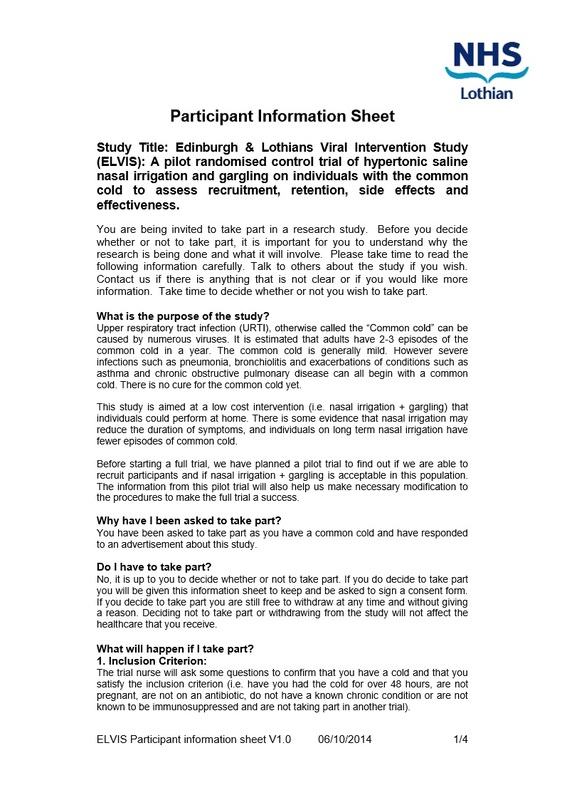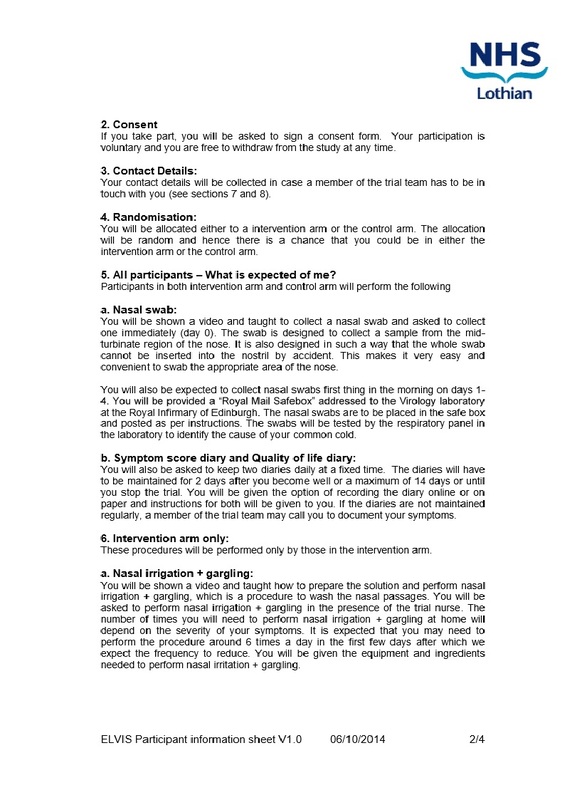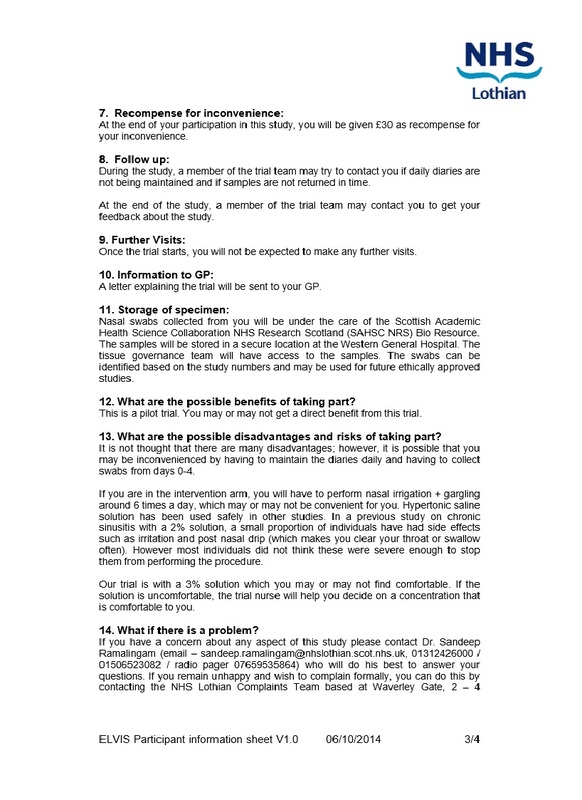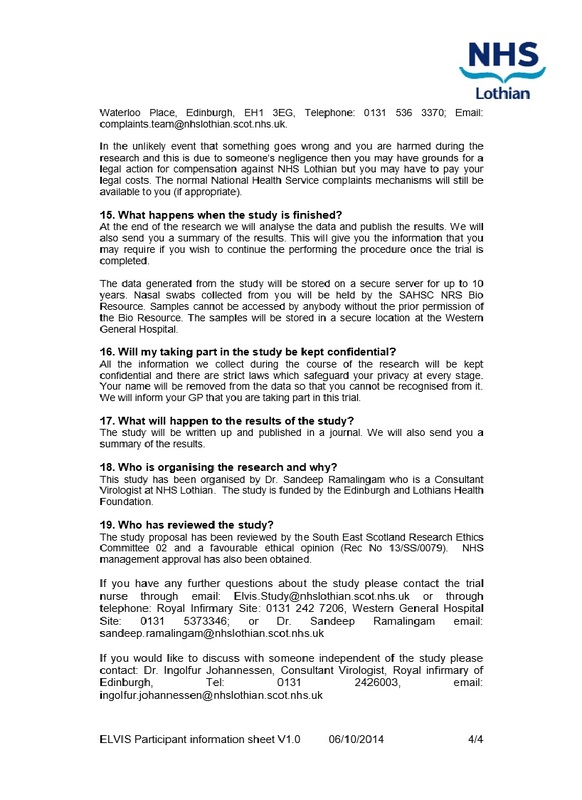Participant Information Sheet:
|
| ||||||
Study Title: Edinburgh & Lothians
Viral Intervention Study (ELVIS): A pilot randomised control trial of
hypertonic saline nasal irrigation and gargling on individuals with the common
cold to assess recruitment, retention, side effects and effectiveness.
You are being invited to take part in a research study. Before you decide whether or not to take part, it is important for you to understand why the research is being done and what it will involve. Please take time to read the following information carefully. Talk to others about the study if you wish. Contact us if there is anything that is not clear or if you would like more information. Take time to decide whether or not you wish to take part.
What is the purpose of the study?
Upper respiratory tract infection (URTI), otherwise called the “Common cold” can be caused by numerous viruses. It is estimated that adults have 2-3 episodes of the common cold in a year. The common cold is generally mild. However severe infections such as pneumonia, bronchiolitis and exacerbations of conditions such as asthma and chronic obstructive pulmonary disease can all begin with a common cold. There is no cure for the common cold yet.
This study is aimed at a low cost intervention (i.e. nasal irrigation + gargling) that individuals could perform at home. There is some evidence that nasal irrigation may reduce the duration of symptoms, and individuals on long term nasal irrigation have fewer episodes of common cold.
Before starting a full trial, we have planned a pilot trial to find out if we are able to recruit participants and if nasal irrigation + gargling is acceptable in this population. The information from this pilot trial will also help us make necessary modification to the procedures to make the full trial a success.
Why have I been asked to take part?
You have been asked to take part as you have a common cold and have responded to an advertisement about this study.
Do I have to take part?
No, it is up to you to decide whether or not to take part. If you do decide to take part you will be given this information sheet to keep and be asked to sign a consent form. If you decide to take part you are still free to withdraw at any time and without giving a reason. Deciding not to take part or withdrawing from the study will not affect the healthcare that you receive.
What will happen if I take part?
1. Inclusion Criterion:
The trial nurse will ask some questions to confirm that you have a cold and that you satisfy the inclusion criterion (i.e. have you had the cold for over 48 hours, are not pregnant, are not on an antibiotic, do not have a known chronic condition or are not known to be immunosuppressed and are not taking part in another trial).
2. Consent
If you take part, you will be asked to sign a consent form. Your participation is voluntary and you are free to withdraw from the study at any time.
3. Contact Details:
Your contact details will be collected in case a member of the trial team has to be in touch with you (see sections 7 and 8).
4. Randomisation:
You will be allocated either to a intervention arm or the control arm. The allocation will be random and hence there is a chance that you could be in either the intervention arm or the control arm.
5. All participants – What is expected of me?
Participants in both intervention arm and control arm will perform the following
a. Nasal swab:
You will be shown a video and taught to collect a nasal swab and asked to collect one immediately (day 0). The swab is designed to collect a sample from the mid-turbinate region of the nose. It is also designed in such a way that the whole swab cannot be inserted into the nostril by accident. This makes it very easy and convenient to swab the appropriate area of the nose.
You will also be expected to collect nasal swabs first thing in the morning on days 1-4. You will be provided a “Royal Mail Safebox” addressed to the Virology laboratory at the Royal Infirmary of Edinburgh. The nasal swabs are to be placed in the safe box and posted as per instructions. The swabs will be tested by the respiratory panel in the laboratory to identify the cause of your common cold.
b. Symptom score diary and Quality of life diary:
You will also be asked to keep two diaries daily at a fixed time. The diaries will have to be maintained for 2 days after you become well or a maximum of 14 days or until you stop the trial. You will be given the option of recording the diary online or on paper and instructions for both will be given to you. If the diaries are not maintained regularly, a member of the trial team may call you to document your symptoms.
6. Intervention arm only:
These procedures will be performed only by those in the intervention arm.
a. Nasal irrigation + gargling:
You will be shown a video and taught how to prepare the solution and perform nasal irrigation + gargling, which is a procedure to wash the nasal passages. You will be asked to perform nasal irrigation + gargling in the presence of the trial nurse. The number of times you will need to perform nasal irrigation + gargling at home will depend on the severity of your symptoms. It is expected that you may need to perform the procedure around 6 times a day in the first few days after which we expect the frequency to reduce. You will be given the equipment and ingredients needed to perform nasal irritation + gargling.
7. Recompense for inconvenience:
At the end of your participation in this study, you will be given £30 as recompense for your inconvenience.
8. Follow up:
During the study, a member of the trial team may try to contact you if daily diaries are not being maintained and if samples are not returned in time.
At the end of the study, a member of the trial team may contact you to get your feedback about the study.
9. Further Visits:
Once the trial starts, you will not be expected to make any further visits.
10. Information to GP:
A letter explaining the trial will be sent to your GP.
11. Storage of specimen:
Nasal swabs collected from you will be under the care of the Scottish Academic Health Science Collaboration NHS Research Scotland (SAHSC NRS) Bio Resource. The samples will be stored in a secure location at the Western General Hospital. The tissue governance team will have access to the samples. The swabs can be identified based on the study numbers and may be used for future ethically approved studies.
12. What are the possible benefits of taking part?
This is a pilot trial. You may or may not get a direct benefit from this trial.
13. What are the possible disadvantages and risks of taking part?
It is not thought that there are many disadvantages; however, it is possible that you may be inconvenienced by having to maintain the diaries daily and having to collect swabs from days 0-4.
If you are in the intervention arm, you will have to perform nasal irrigation + gargling around 6 times a day, which may or may not be convenient for you. Hypertonic saline solution has been used safely in other studies. In a previous study on chronic sinusitis with a 2% solution, a small proportion of individuals have had side effects such as irritation and post nasal drip (which makes you clear your throat or swallow often). However most individuals did not think these were severe enough to stop them from performing the procedure.
Our trial is with a 3% solution which you may or may not find comfortable. If the solution is uncomfortable, the trial nurse will help you decide on a concentration that is comfortable to you.
14. What if there is a problem?
If you have a concern about any aspect of this study please contact Dr. Sandeep Ramalingam (email – [email protected], 01312426000 / 01506523082 / radio pager 07659535864) who will do his best to answer your questions. If you remain unhappy and wish to complain formally, you can do this by contacting the NHS Lothian Complaints Team based at Waverley Gate, 2 – 4 Waterloo Place, Edinburgh, EH1 3EG, Telephone: 0131 536 3370; Email: [email protected].
In the unlikely event that something goes wrong and you are harmed during the research and this is due to someone‘s negligence then you may have grounds for a legal action for compensation against NHS Lothian but you may have to pay your legal costs. The normal National Health Service complaints mechanisms will still be available to you (if appropriate).
15. What happens when the study is finished?
At the end of the research we will analyse the data and publish the results. We will also send you a summary of the results. This will give you the information that you may require if you wish to continue the performing the procedure once the trial is completed.
The data generated from the study will be stored on a secure server for up to 10 years. Nasal swabs collected from you will be held by the SAHSC NRS Bio Resource. Samples cannot be accessed by anybody without the prior permission of the Bio Resource. The samples will be stored in a secure location at the Western General Hospital.
16. Will my taking part in the study be kept confidential?
All the information we collect during the course of the research will be kept confidential and there are strict laws which safeguard your privacy at every stage. Your name will be removed from the data so that you cannot be recognised from it. We will inform your GP that you are taking part in this trial.
17. What will happen to the results of the study?
The study will be written up and published in a journal. We will also send you a summary of the results.
18. Who is organising the research and why?
This study has been organised by Dr. Sandeep Ramalingam who is a Consultant Virologist at NHS Lothian. The study is funded by the Edinburgh and Lothians Health Foundation.
19. Who has reviewed the study?
The study proposal has been reviewed by the South East Scotland Research Ethics Committee 02 and a favourable ethical opinion (Rec No 13/SS/0079). NHS management approval has also been obtained.
If you have any further questions about the study please contact the trial nurse through email: [email protected] or through telephone: Royal Infirmary Site: 0131 242 7206, Western General Hospital Site: 0131 5373346; or Dr. Sandeep Ramalingam email: [email protected]
If you would like to discuss with someone independent of the study please contact: Dr. Ingolfur Johannessen, Consultant Virologist, Royal infirmary of Edinburgh, Tel: 0131 2426003, email: [email protected]
You are being invited to take part in a research study. Before you decide whether or not to take part, it is important for you to understand why the research is being done and what it will involve. Please take time to read the following information carefully. Talk to others about the study if you wish. Contact us if there is anything that is not clear or if you would like more information. Take time to decide whether or not you wish to take part.
What is the purpose of the study?
Upper respiratory tract infection (URTI), otherwise called the “Common cold” can be caused by numerous viruses. It is estimated that adults have 2-3 episodes of the common cold in a year. The common cold is generally mild. However severe infections such as pneumonia, bronchiolitis and exacerbations of conditions such as asthma and chronic obstructive pulmonary disease can all begin with a common cold. There is no cure for the common cold yet.
This study is aimed at a low cost intervention (i.e. nasal irrigation + gargling) that individuals could perform at home. There is some evidence that nasal irrigation may reduce the duration of symptoms, and individuals on long term nasal irrigation have fewer episodes of common cold.
Before starting a full trial, we have planned a pilot trial to find out if we are able to recruit participants and if nasal irrigation + gargling is acceptable in this population. The information from this pilot trial will also help us make necessary modification to the procedures to make the full trial a success.
Why have I been asked to take part?
You have been asked to take part as you have a common cold and have responded to an advertisement about this study.
Do I have to take part?
No, it is up to you to decide whether or not to take part. If you do decide to take part you will be given this information sheet to keep and be asked to sign a consent form. If you decide to take part you are still free to withdraw at any time and without giving a reason. Deciding not to take part or withdrawing from the study will not affect the healthcare that you receive.
What will happen if I take part?
1. Inclusion Criterion:
The trial nurse will ask some questions to confirm that you have a cold and that you satisfy the inclusion criterion (i.e. have you had the cold for over 48 hours, are not pregnant, are not on an antibiotic, do not have a known chronic condition or are not known to be immunosuppressed and are not taking part in another trial).
2. Consent
If you take part, you will be asked to sign a consent form. Your participation is voluntary and you are free to withdraw from the study at any time.
3. Contact Details:
Your contact details will be collected in case a member of the trial team has to be in touch with you (see sections 7 and 8).
4. Randomisation:
You will be allocated either to a intervention arm or the control arm. The allocation will be random and hence there is a chance that you could be in either the intervention arm or the control arm.
5. All participants – What is expected of me?
Participants in both intervention arm and control arm will perform the following
a. Nasal swab:
You will be shown a video and taught to collect a nasal swab and asked to collect one immediately (day 0). The swab is designed to collect a sample from the mid-turbinate region of the nose. It is also designed in such a way that the whole swab cannot be inserted into the nostril by accident. This makes it very easy and convenient to swab the appropriate area of the nose.
You will also be expected to collect nasal swabs first thing in the morning on days 1-4. You will be provided a “Royal Mail Safebox” addressed to the Virology laboratory at the Royal Infirmary of Edinburgh. The nasal swabs are to be placed in the safe box and posted as per instructions. The swabs will be tested by the respiratory panel in the laboratory to identify the cause of your common cold.
b. Symptom score diary and Quality of life diary:
You will also be asked to keep two diaries daily at a fixed time. The diaries will have to be maintained for 2 days after you become well or a maximum of 14 days or until you stop the trial. You will be given the option of recording the diary online or on paper and instructions for both will be given to you. If the diaries are not maintained regularly, a member of the trial team may call you to document your symptoms.
6. Intervention arm only:
These procedures will be performed only by those in the intervention arm.
a. Nasal irrigation + gargling:
You will be shown a video and taught how to prepare the solution and perform nasal irrigation + gargling, which is a procedure to wash the nasal passages. You will be asked to perform nasal irrigation + gargling in the presence of the trial nurse. The number of times you will need to perform nasal irrigation + gargling at home will depend on the severity of your symptoms. It is expected that you may need to perform the procedure around 6 times a day in the first few days after which we expect the frequency to reduce. You will be given the equipment and ingredients needed to perform nasal irritation + gargling.
7. Recompense for inconvenience:
At the end of your participation in this study, you will be given £30 as recompense for your inconvenience.
8. Follow up:
During the study, a member of the trial team may try to contact you if daily diaries are not being maintained and if samples are not returned in time.
At the end of the study, a member of the trial team may contact you to get your feedback about the study.
9. Further Visits:
Once the trial starts, you will not be expected to make any further visits.
10. Information to GP:
A letter explaining the trial will be sent to your GP.
11. Storage of specimen:
Nasal swabs collected from you will be under the care of the Scottish Academic Health Science Collaboration NHS Research Scotland (SAHSC NRS) Bio Resource. The samples will be stored in a secure location at the Western General Hospital. The tissue governance team will have access to the samples. The swabs can be identified based on the study numbers and may be used for future ethically approved studies.
12. What are the possible benefits of taking part?
This is a pilot trial. You may or may not get a direct benefit from this trial.
13. What are the possible disadvantages and risks of taking part?
It is not thought that there are many disadvantages; however, it is possible that you may be inconvenienced by having to maintain the diaries daily and having to collect swabs from days 0-4.
If you are in the intervention arm, you will have to perform nasal irrigation + gargling around 6 times a day, which may or may not be convenient for you. Hypertonic saline solution has been used safely in other studies. In a previous study on chronic sinusitis with a 2% solution, a small proportion of individuals have had side effects such as irritation and post nasal drip (which makes you clear your throat or swallow often). However most individuals did not think these were severe enough to stop them from performing the procedure.
Our trial is with a 3% solution which you may or may not find comfortable. If the solution is uncomfortable, the trial nurse will help you decide on a concentration that is comfortable to you.
14. What if there is a problem?
If you have a concern about any aspect of this study please contact Dr. Sandeep Ramalingam (email – [email protected], 01312426000 / 01506523082 / radio pager 07659535864) who will do his best to answer your questions. If you remain unhappy and wish to complain formally, you can do this by contacting the NHS Lothian Complaints Team based at Waverley Gate, 2 – 4 Waterloo Place, Edinburgh, EH1 3EG, Telephone: 0131 536 3370; Email: [email protected].
In the unlikely event that something goes wrong and you are harmed during the research and this is due to someone‘s negligence then you may have grounds for a legal action for compensation against NHS Lothian but you may have to pay your legal costs. The normal National Health Service complaints mechanisms will still be available to you (if appropriate).
15. What happens when the study is finished?
At the end of the research we will analyse the data and publish the results. We will also send you a summary of the results. This will give you the information that you may require if you wish to continue the performing the procedure once the trial is completed.
The data generated from the study will be stored on a secure server for up to 10 years. Nasal swabs collected from you will be held by the SAHSC NRS Bio Resource. Samples cannot be accessed by anybody without the prior permission of the Bio Resource. The samples will be stored in a secure location at the Western General Hospital.
16. Will my taking part in the study be kept confidential?
All the information we collect during the course of the research will be kept confidential and there are strict laws which safeguard your privacy at every stage. Your name will be removed from the data so that you cannot be recognised from it. We will inform your GP that you are taking part in this trial.
17. What will happen to the results of the study?
The study will be written up and published in a journal. We will also send you a summary of the results.
18. Who is organising the research and why?
This study has been organised by Dr. Sandeep Ramalingam who is a Consultant Virologist at NHS Lothian. The study is funded by the Edinburgh and Lothians Health Foundation.
19. Who has reviewed the study?
The study proposal has been reviewed by the South East Scotland Research Ethics Committee 02 and a favourable ethical opinion (Rec No 13/SS/0079). NHS management approval has also been obtained.
If you have any further questions about the study please contact the trial nurse through email: [email protected] or through telephone: Royal Infirmary Site: 0131 242 7206, Western General Hospital Site: 0131 5373346; or Dr. Sandeep Ramalingam email: [email protected]
If you would like to discuss with someone independent of the study please contact: Dr. Ingolfur Johannessen, Consultant Virologist, Royal infirmary of Edinburgh, Tel: 0131 2426003, email: [email protected]




